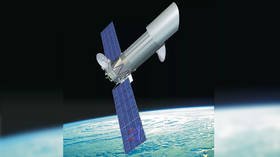Move over, Hubble! Russia to spend $50 million to build high-tech ultraviolet telescope to be launched into space in October 2025

Russia has allocated around 3.7 billion rubles ($50 million) to build a state-of-the-art space telescope with the ability to observe in ultraviolet, designed to see parts of the cosmos inaccessible to ground-based equipment.
According to RIA Novosti, Russia’s space agency Roscosmos and its subsidiary Lavochkin signed a contract to build the Spektr-UV, with work scheduled to be completed by the end of 2025.
The telescope is designed to use ultraviolet observe parts of space inaccessible to ground-based telescopes. It will be launched into space, in a similar way to the US’ Hubble, and will allow researchers to study stars, galaxies, and black holes, as well as the atmosphere of planets and exoplanets, and comets.
It will also be equipped with spectrographs and cameras to produce high-quality images.
Also on rt.com Underwater telescope placed below Siberia’s Lake Baikal as Russian scientists aim to detect particles from billions of years agoThe Spektr-UV is the second telescope announced by Russia this month. Last week, it was revealed that the Altai Optical-Laser Center was commissioned to build a ground-based optical-laser system to observe satellites, making it possible to assess their condition from Earth. It will also be able to determine what kind of equipment is on foreign satellites and detect space debris that threatens domestic equipment in orbit.
The telescope will be located in the Zmeinogorsk district of Altai Krai, chosen because of its atmosphere and beneficial observation conditions.
Earlier this year, Russian scientists launched a deep underwater telescope into Lake Baikal, the world’s largest freshwater lake by volume. The equipment is designed to detect high-energy cosmic particles, and placing the device in a large body of pristine water, where there are no impurities, increases the chances of discovering them. With the newly discovered information, scientists believe they will be able to learn more about what happened in the universe billions of years ago.
Like this story? Share it with a friend!













